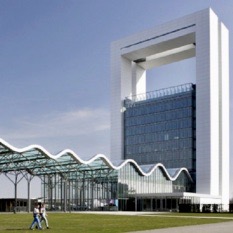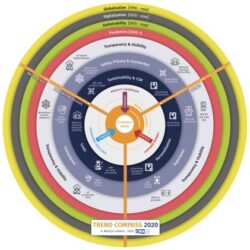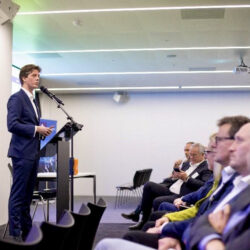BISCI intensifies focus on digitalization and sustainable supply chain innovation

Despite still being in its first year, the Brightlands Institute for Supply Chain Innovation (BISCI) is already intensifying its focus on digitalization and sustainability. Plans for the future include BISCI’s first annual Supply Chain Innovation Conference this February.
BISCI’s story began less than a year ago. The institute was set up by the Netherlands’ Maastricht University and the Province of Limburg in early 2019 to drive supply chain innovation by combining expertise from knowledge institutions, businesses and government. Today, the institute has a master’s programme running with 35 students as well as research and PhD projects. One example is BISCI’s project on smart packaging. In collaboration with a consortium of companies, the study aims to use advanced sensor technology to make supply chains more efficient and sustainable.
Sustainability at the heart BISCI
BISCI’s expertise lies in supply chain innovation. Within this field, the institute focuses on two main research themes: digitalization and sustainability. “Creating a more sustainable world is one of society’s most pressing challenges. To create change, sustainability needs to become people’s number one priority,” comments Ton Geurts, BISCI’s Business Development Director. “We believe that BISCI can contribute to a more sustainable world by increasing the transparency of supply chains. This is where digitalization and sustainability meet,” he adds, giving an example of how digital tools can enable carbon emissions to be calculated and subsequently reduced in road transport.
What’s next for BISCI?
BISCI is closely connected to the department of Marketing and Supply Chain Management of the Maastricht University School of Business and Economics (SBE), which was strengthened by the Maastricht Sustainability Institute (MSI) at the start of the 2019/2020 academic year. BISCI is part of the ‘ecosystem’ of the Brightlands Greenport Campus Venlo, in which the business community, academics, students and representatives from various government bodies work together through open innovation and co-creation. “At BISCI, we are experts in supply chain management, but at the same time, we bridge the business world with other fields of expertise at SBE,” continues Geurts. “This cross-fertilization is very much welcomed: the goal is to avoid silos and instead emphasize synergies, collaboration and helping each other out.”
In line with this vision to encourage collaboration and share best practices, BISCI will hold its first yearly Supply Chain Innovation Conference in February at the Brightlands Greenport Campus, together with partners Fontys and TNO. The event will offer a varied programme of breakout sessions, keynote speakers and workshops led by BISCI’s academic staff. Topics covered will include marketing and supply chain management, sustainability, digitalization, smart services and artificial intelligence. The event is expected to attract a rich mix of representatives from multinationals, companies from the region, government, the province and the city, students, academics, and local supply chain and logistics stakeholders.
To find out more about the Supply Chain Innovation Conference, visit the event webpage.










